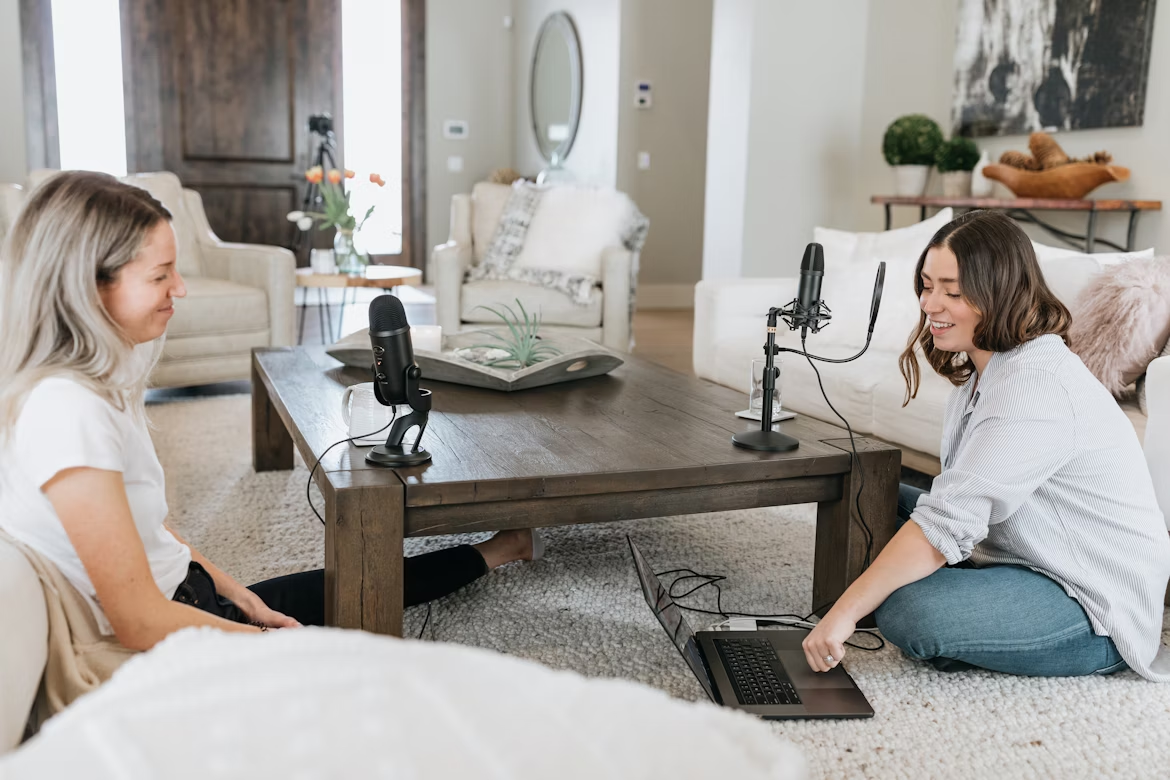
How to build a profitable podcast.
Here are 4 popular podcast topics that spark curiosity, build connections, and keep listeners hooked.


A host, producer, or editor’s job isn’t just to inform; it’s to captivate, provoke questions, and forge a real connection with the audience. Whether it’s diving into personal journeys, distilling life hacks, or unraveling mysteries, the choice of topic naturally shapes a listener’s experience.
Listeners tune in for insights, but they stay for the rush of discovery. By selecting topics that speak to hidden truths, human vulnerability, practical discovery, and the thrill of the unknown, podcasters build shows that keep listeners coming back. Every detail, every emotion uncovered, and every loose end you left dangling invite listeners to tune in again.
People crave access. That’s why behind-the-scenes storytelling is always popular. In the 90s, it was gossip magazines; now it’s podcasts. Whether it’s on a movie set, inside an early-stage startup, or in the world of casino online operators, what’s hidden becomes valuable. These stories share stories and facts – and uncover the most interesting details. Audiences lean in when they hear about missteps, cover-ups, or clever hacks that made something work against the odds.
The psychology is simple. Most listeners rarely see how things actually function. When podcasts reveal the messy middle – like an actor reworking a line that didn’t work, or a tech millionaire’s fortunate start in the industry – it makes the abstract real. And the more unexpected the industry, the greater the pull. Curiosity fuels retention.
In podcasting, access is currency; the minute a host opens the curtains on a process, listeners sense they’re getting privileged information. Take, for example, an episode that details the backstage tension on a film set – suddenly, what seemed polished and inevitable feels more human. It’s not just the facts that matter, but the sense of shared risk and spontaneity.
Hosts often invite guests who can demystify rituals or unfamiliar routines. On a show like Broken Record or Tetragrammaton, a musician or producer might describe how a major album only came together thanks to a chance incident. Of course, listeners don’t just want inadvertent slip-ups; they’re hungry for the tools that can help build their own success.
Vulnerability often draws more attention than easy, smooth rides to success. That’s why so many popular podcast topics involve someone sharing how they made it through a tough time – or failed trying. Listeners want proof that growth isn’t linear. They’re looking for motivation, but also actionable strategies.
From addiction recoveries to career pivots, audiences relate to stories where the stakes are big. A billionaire founder admitting burnout, or a public figure talking about therapy, is a more intriguing and emotional listen than a list of effortless triumphs. The best podcast hosts ask interesting questions without feeling intrusive. They balance storytelling with self-reflection, making each episode both intimate and instructive.
The honest, awkward details intrigue listeners. The story of a marathoner who didn’t finish their first race, but returned month after month, resonates more deeply than a one-and-done victory. The best podcasts often go in depth on setbacks, unpacking what went wrong, and more importantly, how it felt – whether there was doubt or stubborn hope. David Goggins, a repeat guest on podcasts like The Joe Rogan Experience, shares personal insights about his own fitness journey and the struggles he overcame. His motivational clips often go viral on YouTube and social media.
On a business podcast, an entrepreneur might describe a significant failure – not as a footnote, but as an event that shaped them. The insights gleaned from mistakes, grief of failures, and forced reinventions draw more listeners than easy wins. Audiences grow alongside the host and guests, with reminders that failure doesn’t have to be an endpoint.
Popular podcast topics are dispelling the myth of overnight success. Pods that emphasize introspection over bravado naturally build a more connected audience. When a recognizable face (or voice) models vulnerability in public, it grants others space for their own struggles and ambitions, and turns the podcast into more than just entertainment – it becomes inspiration for listeners to put into action in their own lives.

Some of the most popular podcast topics focus on how to live smarter, rather than harder. Audiences turn to voices like Dr. Mike Israetel on Renaissance Periodization, Chris Williamson on Modern Wisdom, and Andrew Huberman on Huberman Lab for evidence-based strategies on fitness, sleep, mental performance, health protocols, and daily routines.
These podcasts take productivity beyond to-do lists. The biohacker Bryan Johnson, for example, uses his own life as a testing ground for brain chemistry optimization and longevity protocols. His diet and supplement regimen double as real-time experiments.
Listeners aren’t looking for generic tips. They want specifics: how to avoid the afternoon crash, which breathing methods sharpen focus, or which supplements are actually worth the money. With personable and humorous hosts, these shows keep listeners engaged without overwhelming them.
This genre thrives on specificity, not vague encouragement. A podcast that breaks down how morning exposure to sunlight affects the body’s internal clock is far more useful than empty platitudes. Listeners respect the hosts who reference clinical studies or personally test every hack. When a host tries three different evening wind-down routines and reports which ones actually improved sleep quality, it makes the advice credible and highly actionable.
Part of the appeal lies in experimentation; audiences enjoy the sense that both host and listeners are looking for self-improvement. Whether it’s a five-minute breathing routine, an unusual approach to structuring the workday, or a habit-stacking method to improve consistency, practical examples stick. The hosts who candidly describe their own setbacks (abandoned habits, failed diet challenges, tech gadgets that didn’t deliver) gain authority through honesty, rather than so-called perfection.
Listeners are also looking for ways to shortcut common frustrations. They want to know which routines are sustainable over the long haul, not just headline-worthy stunts. Podcasts that provide frameworks for deciding among competing priorities, as well as templates that listeners can adjust to their own preferences, stand out in a crowded field. Humor and humility add to the charm.
Curiosity sharpens when there’s no resolution. It’s why podcasts about unsolved crimes, scientific anomalies, and ghost stories rank among the most popular podcast topics. The lack of closure is exactly what keeps people coming back. The popularity of these podcasts mirrors that of Netflix shows like American Murder: Gabby Petito, Icarus, Making a Murderer, and Tiger King.
Whether it’s decoding a decades-old cold case or exploring a more familiar story in more detail, listeners feel part of the process. These shows invite discussion and speculation. That collective uncertainty binds audiences together more than the actual answers (when there are any).
Atmosphere is everything in these shows; they’re best when the details feel immediate and immersive. An interview with a retired detective, or the ambient sound of a rain-soaked alleyway, pulls the listener into the story. Episodes often end with more questions than answers, which makes the listener return next week or click the next episode right away. People often enjoy the ambiguity. Real-life mysteries are often as intriguing as the best fictional crime shows on TV.
The genre of crime and mystery podcasts is broader than serial murders or sensational scandals. Financial fraud, art heists, and intellectual property theft can all make for popular podcast topics. Many podcasts are more niche – for example, the Irish comedian Joanne McNally has explored a fan myth about Avril Lavigne being replaced by a body double. It’s the mystery and unpredictability that keep ears tuned in, and that “aha!” moment is always just out of reach. (In the case of that Avril Lavigne myth, it could be out of reach forever…)
For many listeners, these podcasts fulfil a desire for a certain kind of entertainment that isn’t met by other shows. By exploring blurred moral lines and unresolved endings, listeners get to be sleuths (albeit from the comfort of their homes or workplaces). This genre invites obsession, offers companionship, and rewards those who enjoy stories that don’t tie up neatly. Sometimes the hunt for answers is its own reward.
The power of a podcast is in inviting listeners to become participants – whether it’s in exploration or understanding. If you’re a host, producer, or editor and want to implement the strategies from this post, start with your own curiosity. Dig into those behind-the-scenes moments, encourage guests to share their imperfect paths, experiment with actionable tips, and invite your audience into the process of untangling life’s mysteries.
Don’t be afraid to leave some questions unresolved or to reveal the messiness behind success. It’s often the honest, raw moments that spark engagement. Try to build a show full of insight and one that encourages community. Celebrate your successes, acknowledge your failures, and keep evolving your format based on what resonates with listeners.
You’ll have likely noticed that the shows you return to weren’t always “perfect”. The early episodes might have felt more rough around the edges, but the team grew and improved their final product. The most memorable podcasts aren’t built on formula, but on a willingness to listen, experiment, and share what matters most.


Where you learn how to start and grow a profitable podcast.